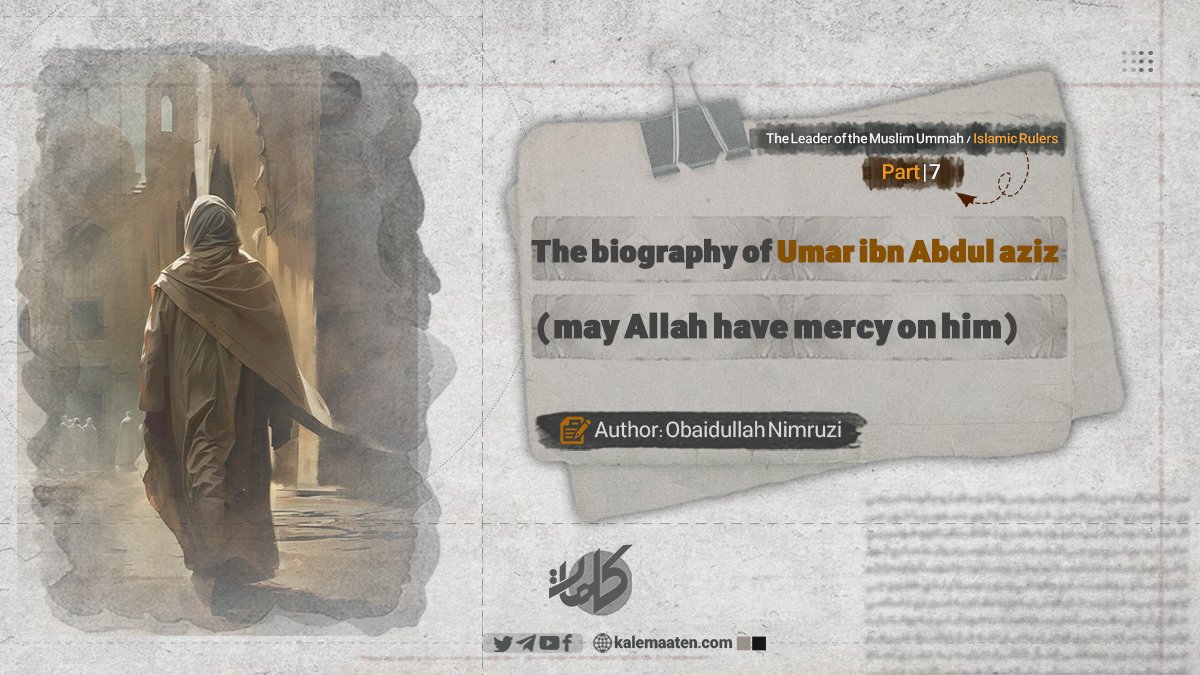
Author: Obaidullah Nimruzi
The Biography of Umar ibn Abdul Aziz ‘May Allah Have Mercy on Him’ (Part 7)
Outstanding Personalities of the Umayyad Era and Their Moral Influences on Society
Despite the materialistic regime of the Umayyads and its natural influences during this time, the dignity of religion and its moral imperatives continued to have a remarkable presence in the lives of Muslims. This religious dignity and moral influence stemmed from individuals who held significant positions in terms of both religion and knowledge; they were known for their devotion to Allah, sincerity, purity of soul, and understanding. Outside the sphere of government, the influence of these great men persisted, and as a result of the heartfelt respect they commanded, Muslims were shielded from numerous shortcomings and errors, preventing them from being swept away by the tide of materialism.
Among these prominent religious figures, the most influential and beloved was Hazrat Ali ibn Hussain, Zain al-Abidin (May Allah be pleased with him). He stood unparalleled in worship, asceticism, and piety. The esteem that Muslims held for him can be illustrated by an incident involving Hisham bin Abdul Malik, who, during his time as crown prince, arrived to circumambulate the Kaaba. Unable to reach the Hajjar Al-Aswad due to the throngs of people, he waited for the crowd to thin out. At that moment, Hazrat Ali bin Hussain (may Allah have mercy on him) arrived, and as soon as he did, the crowd made way for him, allowing him to easily circumambulate and kiss the Hajjar Al-Aswad. Wherever he passed, people opened the path for him out of respect. Hisham, perplexed, asked, “Who is he?” The famous poet of the Umayyad era, Farazdaq, responded to Hisham’s curiosity through impromptu poetry, introducing Hazrat Ali in terms befitting his stature.
This poem by Farazdaq is still preserved in Arabic literature as a memento, bearing the following title:
هذا الذي تعرف البطحاء وطاته والبیت یعرف والحل والحرم
Researchers note that “in this poem, verses have been added over time.”
Similarly, other esteemed members of the Ahl al-Bayt, such as Hazrat Hassan al-Muthanna and his son Hazrat Abdullah al-Muhd, as well as other notable figures like Hazrat Salim ibn Abdullah ibn Umar (may Allah be pleased with them), Qasim ibn Muhammad ibn Abi Bakr, Hazrat Saeed ibn al-Musayyib, and Hazrat Urwa ibn Zubair, served as religious role models for Muslims. They carved a niche in truthfulness, dedication to scientific inquiry, sincere religious service, and moral excellence by distancing themselves from governmental involvement and severing ties with the ruling apparatus.
In light of the increasingly powerful propaganda of the government, while the religious and moral influences of these figures may have seemed insufficient, they were certainly not without impact. As a result, a degree of moderation and religious respect pervaded the social lives of Muslims, occasionally leading to a yearning for inner reform amidst worldly pursuits.
The Necessity of Revolution in Government and Its Problems
Gradually, the effects of political revolution became broader and more profound. The number of prominent religious figures, guardians of the original characteristics and ethics of Islam from the first century, began to wane. The government’s sphere of influence expanded and strengthened. Under these circumstances, a religious and moral revolution was implausible without a transformation of the government apparatus, as the Umayyad regime was supported by a solid military foundation that could not be easily dismantled. Moreover, at that time, there was no internal or external force capable of overcoming that formidable army in armed conflict.
In recent history, two significant struggles had occurred: one was the noble endeavor of Syedna Hazrat Hussain, while the second stemmed from the courageous resistance of Syedna Hazrat Abdullah ibn Zubair. The prospects for a successful armed struggle were therefore grim, and the avenues for reform and change in the hereditary government appeared closed. The fate of the Muslims seemed sealed for generations to come. In this dire situation, a miracle was required to ensure the triumph of Islam and the transformation of the wayward state, and that miracle ultimately manifested.
Continues…


